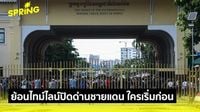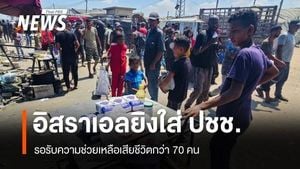On June 30, 2025, tensions along the Thailand-Cambodia border escalated amid a complex web of diplomatic, military, and political maneuvers that have captured the attention of both nations and the wider region. The situation, rooted in longstanding territorial disputes and deep-seated political rivalries, has seen a series of confrontations, border closures, and diplomatic exchanges that underscore the fragile state of relations between the two neighbors.
The immediate flashpoint occurred on June 29, when Cambodian leader Hun Manet publicly claimed that Thailand had sent a letter requesting a temporary relaxation of border closures to allow trucks carrying goods stuck at the border to pass through. However, Cambodia did not respond positively to this request. Hun Manet took to Facebook to emphasize Cambodia’s position: "The Thai side must open the border first before Cambodia will follow suit." His message highlighted Cambodia’s insistence on reciprocity and control over border operations, signaling that Phnom Penh would not be the first to yield.
Following this, the Royal Thai Army spokesperson explained that Thailand’s actions were in line with Prime Minister Paetongtarn Shinawatra’s policy aimed at alleviating the impact on citizens affected by border restrictions. A National Security Council meeting on June 27 had approved a temporary easing of restrictions specifically for Thai goods trucks that had registered their cargo with customs by June 25. These vehicles were permitted to cross from Sa Kaeo province into Cambodia and return to Thailand, aiming to clear backlogs and reduce economic disruption.
Despite these efforts, Cambodia’s Ministry of Interior issued a strict directive forbidding any goods transport across the Thai-Cambodian border or within any border region, effectively nullifying Thailand’s attempts to resume cross-border trade. As a result, no trucks crossed into Cambodia on June 29, leaving goods stranded and businesses affected.
In a parallel move, Thailand’s Burapha Task Force relaxed rules for two groups of Cambodian workers in Thailand: those holding general Border Passes and those authorized for temporary work. These workers were allowed to remain temporarily in Thailand until further notice from Cambodian authorities, reflecting a humanitarian approach amid the border tensions.
Adding to the complexity, Hun Sen, President of the Cambodian Senate and a long-time power broker in Phnom Penh, issued a warning to Cambodians about AI-generated fake videos circulating on social media. One such clip falsely claimed that Hun Sen was soliciting 300 baht per person to fund an army to fight Thailand, promising a reward of 50,000 baht upon victory. He urged citizens to be vigilant and help eliminate such misinformation.
Meanwhile, rumors of a Thai military invasion plan involving special forces and Gripen fighter jets targeting Cambodian supply depots were debunked by the Royal Thai Air Force as falsehoods. Officials warned the public against spreading this disinformation, which could inflame tensions unnecessarily.
Looking back, the border conflict has deeper roots. On May 28, 2025, a violent clash between Thai and Cambodian soldiers erupted near Chong Bok in Ubon Ratchathani province, an area with overlapping territorial claims and no formal border demarcation. Thailand had sought negotiations, but Cambodian forces opened fire first, prompting Thai soldiers to respond in kind. Fortunately, no Thai casualties were reported. Following this, Hun Manet claimed Cambodia was not the first to close the border and promised to reopen it within five hours if Thailand opened its side first and guaranteed no arbitrary closures thereafter.
Political voices in Thailand have weighed in on the crisis. Opposition leader Natthapong Ruangpanyawut pointed to the personal rivalries between the families of the two nations’ leaders as a root cause. He advocated for official state-to-state talks rather than informal family negotiations and urged the Thai government to pursue accountability, especially regarding the assassination of Lim Kimya, a Cambodian opposition figure, which involved Thai gunmen but was allegedly orchestrated by individuals close to Hun Sen. Natthapong stressed that serious investigation and pressure on Hun Sen could help ease tensions.
Similarly, the Bhumjaithai Party called for the border issue to be brought into Thailand’s parliamentary system for open debate and clarity. Party spokesperson Nan Buntida Somchai argued that without formal discussion in the legislature, misunderstandings and problems would only multiply.
On the analytical front, political commentator Kaeosara Atiphot offered a sobering assessment. He suggested that Hun Sen’s regime, facing internal instability and waning public support, deliberately stoked the border crisis to redirect Cambodian public anger away from his government and toward Thailand. By accusing Thailand of aggression and restricting Thai goods, Hun Sen sought to unify Cambodians under his family’s leadership, portraying them as the nation’s protectors.
Kaeosara described Hun Sen’s tactics as including cutting off electricity, internet, and fuel supplies from Thailand, causing hardship for ordinary Cambodians to fuel resentment against Thailand rather than the regime itself. He warned that Thai soldiers along the border were at constant risk of becoming victims of staged provocations designed to escalate conflict.
The commentator criticized the Thai government for its passivity and urged stronger diplomatic moves, such as inviting ASEAN ambassadors to inspect the border and raising the issue at the United Nations. He also condemned Prime Minister Paetongtarn’s phone call to Hun Sen on June 29 to discuss calming the situation and cooperation, viewing it as a weak, pleading approach rather than a firm political negotiation. According to Kaeosara, this call undermined Thai credibility and failed to project the necessary strength to counter Hun Sen’s maneuvers.
Moreover, Kaeosara linked the turmoil to alleged secret agreements involving former Thai Prime Minister Thaksin Shinawatra and Hun Sen, particularly concerning the division of oil concessions in the Gulf of Thailand. He suggested that Thaksin’s return from exile and promises to share oil resources had emboldened Hun Sen, complicating the border dispute with vested economic interests behind the scenes.
Looking ahead, Kaeosara stressed that Thailand’s future leaders must possess full authority, strategic acumen, and public trust to effectively confront Hun Sen’s challenges. He questioned whether the current Prime Minister, perceived as lacking independence and strength, could meet these demands.
In sum, the Thailand-Cambodia border crisis is a multifaceted issue involving territorial disputes, political rivalries, misinformation campaigns, and economic interests. Both sides have taken hardline stances, with Cambodia enforcing strict border closures and Thailand seeking to ease the impact on its citizens while navigating complex domestic and international pressures.
As the situation unfolds, observers emphasize the need for transparent state-level dialogue, regional diplomatic engagement, and careful management to prevent further escalation. The coming weeks will be crucial in determining whether cooler heads prevail or if the simmering tensions ignite into broader conflict.




